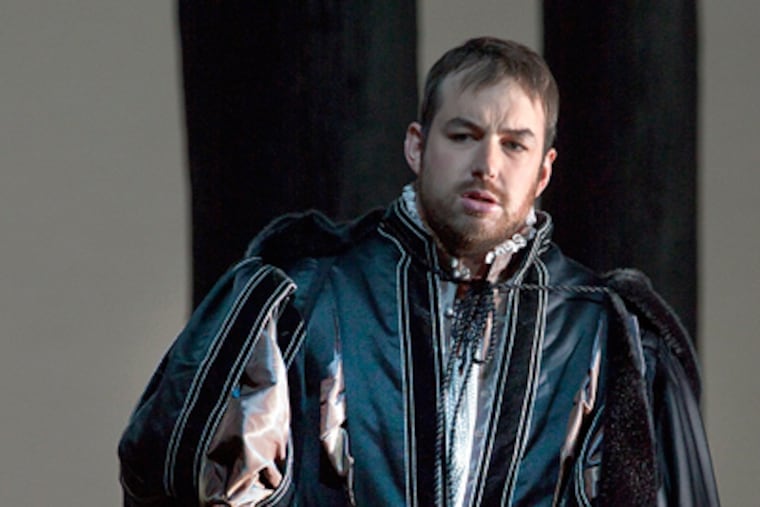The voice doctor
When opera star Stephen Costello needed a tonsillectomy, Academy of Vocal Arts teacher Bill Schuman was at his side. He not only builds voices, he reclaims them.

Though the Metropolitan Opera's season-opening production of Anna Bolena has been a magnet for mixed reviews, the live, movie-theater simulcast of the opera at 12:55 p.m. Saturday will likely offer reassurance for the longevity of Stephen Costello, 30, Philadelphia's contribution to tenordom.
Whatever Costello's daily vocal ups and downs, tonsil-related infections will no longer be a factor. Though his July tonsillectomy led to bleeding that landed him briefly back in the hospital in Northeast Philadelphia where he grew up, he has no regrets.
"Every day I feel better because of it," he said last week in New York. "The shows keep getting better."
Getting to that point, though, required a battery of people - his parents and his wife, soprano Ailyn Perez, plus voice teacher Bill Schuman, who is on the Academy of Vocal Arts faculty and is known as not only a major voice builder but also a voice reclaimer. Besides teaching such AVA grads as Latonia Moore, Schuman has done mid-career tuneups for singers including Aprile Millo and the late Jerry Hadley. Costello wouldn't have dreamed of scheduling a tonsillectomy without his intensive input. But this one, says Schuman, was "a nightmare."
"We had talked about him getting the tonsils out next summer and taking the summer off," said Schuman. "But when he went to Glyndebourne L'elisir d'amore], he said, 'Bill, I need you over here!' That's not usual for him. He canceled the second and third performances. He never cancels."
The opening had been successful. But Glyndebourne is in the country - allergy alley - and Costello's throat was in distress. He had often sung despite infections in recent years, but not like this.
"I took two rounds of antibiotics and it didn't help," he said. "There was no problem with my voice. I could sing. It was just an all-day process. I'd get up in the morning and start vocalizing to get my throat to relax . . . but I was very uncomfortable. I opened the Met season in a matter of weeks. I needed to have it done."
The surgery was done July 15 in New York City; the first day of Met rehearsals was Aug. 22. Singing the role of Percy in Anna Bolena, Costello needed at least six high Cs - a seemingly distant possibility when, after three weeks of post-surgery vocal rest, he began re-climbing the scales under Schuman's guidance.
And now? "His voice is growing. It's deepening," remarked retired soprano Renata Scotto after hearing a rehearsal.
"While you're singing, Bill can visualize what your mouth is doing, how it produces the sound," said Costello. "It's an incredible talent."
Schuman also hears potential. Among the jurors who auditioned Costello for AVA, only Schuman and AVA music director Christofer Macatsoris heard the voice that was to come.
A big, exuberant man who is always catching trains and planes to hear his students, Schuman talks about his own tenor training as the basis of his work, and about turning the page on that part of his life to give himself completely to teaching.
"There's a picture of me at age 6 at the piano coaching my brother. He was singing, he was 4, and I was telling him what to do," says Schuman, 53. Now, after 20-plus years at AVA, his influence in opera has become far more pervasive than if he had had a major singing career of his own.
The skills he cultivates are simple. "The most important thing," he says, "is sense memory," knowing how healthy singing feels so they can do it every day."
His role as a voice reclaimer is more elusive. That involves managing damage left by less-sympathetic teachers. His most successful client is leading Met tenor Marcello Giordani, who came to him in his 20s in vocal shambles. Now working with the long-absent Met veteran Aprile Millo, Schuman believes she will return with many good years.
But when? A singer's psychology is another matter. One of opera's great heartbreaks was tenor Hadley. Schuman had him back onstage and on the road to vocal recovery when he killed himself due to a troubled personal life in 2007 at age 55.
Schuman also laments that he wasn't of Renata Tebaldi's generation. That great soprano's final years were marred by vocal problems that Schuman believes could have been successfully addressed.
No wonder his students/clients consider him so crucial. When a beloved music figure recently died, apparently of a heart attack, Costello called up the somewhat chunky Schuman pleading, "Bill, stop eating ice cream! You have to stop right now!"
Schuman smiles at the thought. It's nice to be valued.